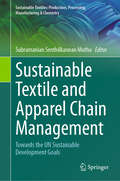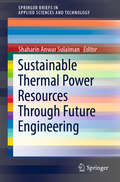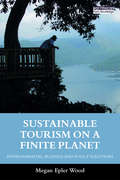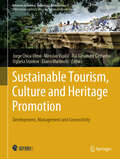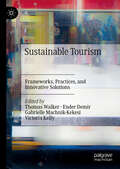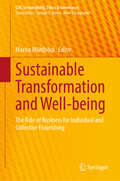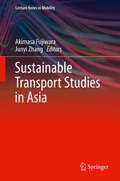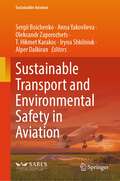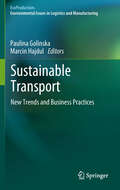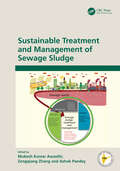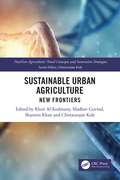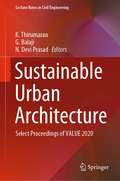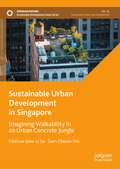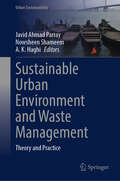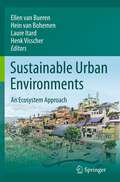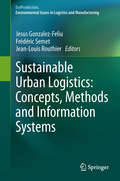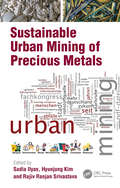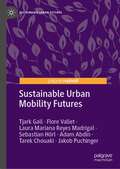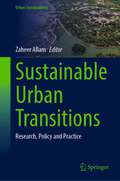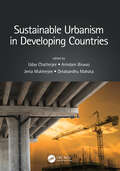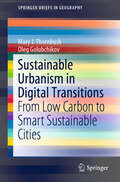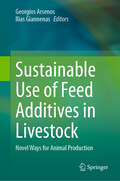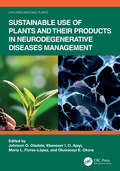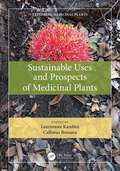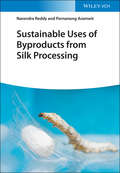- Table View
- List View
Sustainable Textile and Apparel Chain Management: Towards the UN Sustainable Development Goals (Sustainable Textiles: Production, Processing, Manufacturing & Chemistry)
by Subramanian Senthilkannan MuthuThis book provides a variety of cases at the intersection of the United Nations 17 Sustainable Development Goals (SDGs) and sustainable textile and apparel supply chain management. The cases presented detail the relationship between apparel production and consumption and the SDGS and explore and how the textile and apparel industry can contribute to achieving these goals along the supply chain.
Sustainable Thermal Power Resources Through Future Engineering (SpringerBriefs in Applied Sciences and Technology)
by Shaharin Anwar SulaimanThis book presents recent research in the field of nonconventional and renewable energy, and energy efficiency in the context of thermal power. It addresses energy-efficiency and environmental issues that are critical in the production of thermal power, and also examines various applications, especially air conditioning, internal combustion engines, and solar electric power plants.
Sustainable Tourism on a Finite Planet: Environmental, Business and Policy Solutions
by Megan Epler WoodThis book helps all those involved in international tourism develop the new skills, tools and investments required to protect irreplaceable global resources from the impacts of escalating tourism demand over the next 50 years. It documents how technology and the growing global middle class are driving a travel revolution which requires a new paradigm in managing tourism destinations. Travel and tourism supply chains and business models for hotels, tour operators, cruise lines, airlines and airports are analysed and environmental management techniques are proposed for each sector. A pragmatic set of solutions are offered to support the transition to lower impact tourism development worldwide. It recommends that decision makers assess the current and future value of natural, social, and cultural capital to guide investment in destinations and protect vital resources. Case studies illustrate why budgets to protect local destinations are consistently underestimated and offer guidance on new metrics. Innovative approaches are proposed to support the transition to green infrastructure, protect incomparable landscapes, and engage local people in the monitoring of vital indicators to protect local resources. It provides students, professionals, and policy makers with far-reaching recommendations for new educational programs, professional expertise, financing, and legal frameworks to lower tourism’s rapidly escalating carbon impacts and protect the health and well-being of local populations, ecosystems, cultures, and monuments worldwide.
Sustainable Tourism, Culture and Heritage Promotion: Development, Management and Connectivity (Advances in Science, Technology & Innovation)
by Uglješa Stankov Rui Alexandre Castanho Jorge Chica-Olmo Miroslav Vujičić Eliana MartinelliThis proceedings book explores future prospects of cultural, heritage, and religious tourism and how it can impact the socioeconomic complexity of a community and future developments. It includes chapters on contemporary digital age pilgrimage, digital interpretation as a management strategy, tourism in the era of digital communication, and the role of social media in conserving intangible cultural heritage. This book focuses on policies and mechanisms for heritage preservation. It includes cultural heritage tourism management, how the digitalization of data has impacted and further developed tourism, World Heritage classification in urban tourism destinations, cultural tourism products, and experiences. Moreover, it discusses the sustainable environment and geography in tourism. It covers topics such as ecotourism and rural sustainable development, heritage in socioeconomic sustainable development, and tourists' perceptions of tourism. Anotherpart of the book explores the social and economic impacts of tourism. It includes chapters on cycling tourism along the Elbe, residents' perceptions of the socioeconomic benefits of restaurants, architecture of historical mosques, tourism as a driver of soft power, tourists' perceptions of service quality, tourism during the Covid-19 pandemic, gastronomic narratives in tourism, and residents' perceptions of festivals. Also, it pinpoints the focus on user interaction-based development. It includes chapters on the role of community-led initiatives in heritage revitalization and addressing connectivity issues between historical and natural touristic heritage sites. These research papers provide valuable insights into the multidimensional nature of cultural sustainable tourism, covering a wide range of topics and offering diverse perspectives on its development, management, and impact.
Sustainable Tourism: Frameworks, Practices, and Innovative Solutions
by Thomas Walker Victoria Kelly Ender Demir Gabrielle Machnik-KekesiThis edited volume aims to ignite an academic discussion regarding necessary, and urgent, adaption and mitigation strategies for the tourism industry. Now more than ever, there is a need for designing and implementing concrete strategies for a world in which tourism practices are sustainability-minded, not only to rescue this key industry from the devastating effects of the COVID-19 pandemic, but also to limit the effects that it has on pollution, climate change, and at-risk populations. Achieving this goal will require innovations that can help us synchronously adapt to committed change as well as shift our planning processes and alter our behaviours. Including contributions from international experts in the fields of tourism management, economics, political science, finance, business, and sustainability, this book provides much-needed research on sustainable tourism by evaluating current and future trends, global contributions, case studies and new research evaluating issuessuch as over-tourism and under-tourism, as well as the general effects that tourism have on a region’s economy, environment, culture, and society. In addition, it will explore how sustainable tourism can help alleviate, mitigate, or control these problems. This book aims to provide insight into how we can still enjoy and benefit from touristic travel while implementing appropriate strategies and adaptation plans in the areas of health, culture, the economy, and the environment and showcase investigations of alternative tourism frameworks and tourist perspectives. It will be of great interest to academic and practitioner communities in business and policy, as well as economics, tourism management, development studies, finance, cultural heritage management, policymaking and entrepreneurship.
Sustainable Transformation and Well-being: The Role of Business for Individual and Collective Flourishing (CSR, Sustainability, Ethics & Governance)
by Marisa MühlböckIn an era of undeniable human impact on the planet, can business drive sustainable development and enhance well-being for all? This book explores the evolving concept of well-being through a transdisciplinary lens, bridging sustainability, business, and collective flourishing. It examines the business sector's transformative role in promoting well-being through sustainable practices. Featuring insights from diverse disciplines and cultures, the book provides case studies, strategies, and resources for entrepreneurs and managers to achieve well-being in work and life. With contributions from leading scientists, it maps the current landscape, identifies gaps, and sparks new research on linking individual, societal, and planetary well-being. A must-read for those seeking to understand how business can foster a sustainable, well-being-driven future.
Sustainable Transport Studies in Asia
by Akimasa Fujiwara Junyi ZhangThis book aims to provide a good understanding of and perspective on sustainable transport in Asia by focusing on economic, environmental, and social sustainability. It is widely acknowledged that the current situation and trends in transport are not always sustainable in Asia, due in part to the fast-growing economy and the astounding speed of urbanization as well as least-mature governance. As essential research material, the book provides strong support for policy makers and planners by comprehensively covering three groups of strategies, characterized by the words "avoid" (e.g., urban form design and control of car ownership), "shift" (e.g., establishing comprehensive transportation systems and increasing public transportation systems for both intracity and intercity travel), and "improve" (e.g., redesign of paratransit system, low-emission vehicles, intelligent transportation systems, and eco-life). These are elaborated in the book alongside consideration of the uncertainty of policy effects in the future. The book is also valuable for scholars and scientists because of the diverse methodologies presented and proposed herein. Among those are the four-step model with full feedback mechanisms, the bi-level programming model with sustainability goals, data envelopment analysis and stochastic frontier analysis approaches, structural equation models, discrete and/or continuous choice models, copula-based models, survival models, and driving risk models with short-term memory. Using data collected from more than ten Asian cities, including those in both developed and developing nations, the pathway to sustainable transport in Asia gradually becomes clear.
Sustainable Transport and Environmental Safety in Aviation (Sustainable Aviation)
by T. Hikmet Karakoc Alper Dalkiran Sergii Boichenko Anna Yakovlieva Oleksandr Zaporozhets Iryna ShkilniukThis book looks at sustainability and the environmental safety of transport, both key priorities within the global strategy of sustainable development of aviation. Bringing together selected papers presented at the 8th International Scientific-Technical Conference: Problems of Chemmotology – Theory and Practice of Rational Use of Conventional and Alternative Fuels and Lubricants, the contributions examine the theory and practice of aviation chemmotology and safety in transport, including sustainable transport, manufacturing and use of conventional and alternative fuels and lubricants, the use of electric aviation, and systems of fuel supply and fuel infrastructure. This collection will be an invaluable reference for researchers, professionals, and students involved in alternative aviation fuels, transport engineering, sustainable transport development, and fuels and lubricants.
Sustainable Transport: New Trends and Business Practices
by Paulina Golinska Marcin HajdulThe aim of the book is to present the emerging environmental issues in organization and management of transport logistics. The scope of the book includes set of solutions which show different stakeholders' viewpoints on sustainability. It points out how the transport operations organized and conducted in companies and regions might be consistent with the concept of sustainable development. The scope of the book takes into consideration trade-off relations between actors directly and indirectly involved in transport networks. Therefore, the authors present, in individual chapters, innovative approach to eco-friendly organization and coordination of transport processes, as well as management of transport networks.
Sustainable Treatment and Management of Sewage Sludge
by Ashok Pandey Zengqiang Zhang Mukesh Kumar AwasthiThis reference book provides updated information about the technological advancement in sustainable thermochemical bioprocessing of sewage sludge disposal and resource recovery. It discusses the innovative strategies of resource recovery for the formulation of feedstock, clean compost production and safe application. This book traces the main chemical and biological properties of sewage sludge and covers biostabilization, detoxification, the role of microorganisms in sewage sludge management and the sustainable use of sewage sludge from a circular economy perspective. Key Features • Discusses organic waste disposal and recycling • Covers knowledge transfer from waste bioprocessing to commercially important end products • Includes industrial application of biological and thermochemical sewage sludge treatment toward emerging nutrient recovery technologies • Reviews the function and applications of microorganisms in sewage sludge treatment • Describes the application of sewage sludge as fertilizers in agriculture This book is meant for researchers and industry experts in environmental sciences, biochemical engineering and biotechnology.
Sustainable Urban Agriculture: New Frontiers (Nextgen Agriculture)
by Chittaranjan Kole Kheir Al-Kodmany Sharmin Khan Madhav GovindIn the vibrant discourse of urbanization and climate change, Sustainable Urban Agriculture: New Frontiers investigates emerging needs, rising challenges, and opportunities to support urban agriculture. Navigating the dynamic interplay of urbanization and environmental challenges, the book introduces two pivotal agendas for urban sustainability—the "green" agenda, focusing on environmental health, and the "brown" agenda, emphasizing human well-being and social justice. The book embraces a global perspective by confronting geographical biases and advocating for context-specific understanding and early interventions in small and medium cities. This transformative journey guides readers through uncharted territories, fostering profound awareness of urban agriculture's role in shaping a sustainable and resilient future in agriculture.Features Presents information on socio-ecological resilience, shaping a sustainable urban future Unveils practical implications, traversing frontiers where urban cultivation extends beyond crops, cultivating a thriving urban ecosystem Discusses diverse urban agriculture practices, from traditional methods to cutting-edge technologies Providing readers with an understanding of the multifaceted layers inherent in urban agriculture, this volume in the NextGen Agriculture: Novel Concepts and Innovative Strategies series is essential for academics, students, practitioners, and experts in urban agriculture and planning, horticulture, landscape architecture, and plant sciences.
Sustainable Urban Architecture: Select Proceedings of VALUE 2020 (Lecture Notes in Civil Engineering #114)
by K. Thirumaran G. Balaji N. Devi PrasadThis book presents select proceedings of the International Conference on Visionary Action towards Liveable Urban Environments (VALUE 2020). Various topics covered in this book include context responsive architecture, green architecture, energy efficient buildings, energy conservation, inclusive spatial environments, security in buildings and cities, green/smart/ intelligent architecture, sustainable mobility and smart communities. This book will be a valuable reference for students, researchers, and professionals interested in built environment and allied fields.
Sustainable Urban Development in Singapore: Imagining Walkability in an Urban Concrete Jungle (Sustainable Development Goals Series)
by Melissa Liow Li Sa Sam Choon-YinThis book offers theoretical and practical insights into land use, transport, and national policies in one of world’s well-known urban concrete jungle, none other than the Singapore city. The emphasis is situated on Singapore’s attempt to promote walking and cycling. Greater appreciation of walkability thrives on Singapore’s rich history, green city, people and the gastronomic kopitiam and hawker culture. The book offers a comprehensive coverage of walkability as a crucial component of urban design to reduce vehicular congestion with the associated carbon emissions, foster a healthy lifestyle and community participation and create jobs to help the economy. A high income per capita and an aging society, lessons drawn from Singapore’s experience will be useful to other societies. Scholars in sustainable tourism field, urban planners, government bodies, tourist boards, entrepreneurs, national parks board, residents, and inbound travellers will benefit from reading the book.
Sustainable Urban Environment and Waste Management: Theory and Practice (Urban Sustainability)
by Javid Ahmad Parray A. K. Haghi Nowsheen ShameemThis very unique research-oriented edited collection introduces waste and pollution treatment methods that can be adopted at local and international levels and examines appropriate resource management strategies for environmentally related issues. It aims to highlight the important role of education for environmental sustainability, in particular the area of urban waste management. Presenting the latest research topics innovative ideas to educate future citizens regarding sustainable development of our planet, it is of interest to readers who are involved in education, policy, science, and technological innovation for urban waste management. Education and awareness in the field of waste management is significantly important from a global perspective of resource management. The aim of this edited collection is creating an interdisciplinary platform for researchers and practitioners to present and discuss the most recent innovations, trends, and concerns as well as practical challenges encountered and solutions adopted in the fields of Environmental Science. This new book explores the crucial nexus between innovative solutions for waste management, and environmental sustainability in an edited collection. This comprehensive book provides a holistic investigation of the most recent inventions, advancements, and breakthroughs in waste management as the need for solutions to the environmental pollution problem becomes more urgent on a global scale. The book investigates the diverse environmental effect of environmental pollution and emphasizes how urgent it is to resolve the ecological costs of waste contamination.
Sustainable Urban Environments
by Henk Visscher Ellen M. van Bueren Laure Itard Hein Van BohemenThe urban environment - buildings, cities and infrastructure - represents one of the most important contributors to climate change, while at the same time holding the key to a more sustainable way of living. The transformation from traditional to sustainable systems requires interdisciplinary knowledge of the re-design, construction, operation and maintenance of the built environment. Sustainable Urban Environments: An Ecosystem Approach presents fundamental knowledge of the built environment. Approaching the topic from an ecosystems perspective, it shows the reader how to combine diverse practical elements into sustainable solutions for future buildings and cities. You'll learn to connect problems and solutions at different spatial scales, from urban ecology to material, water and energy use, from urban transport to livability and health. The authors introduce and explore a variety of governance tools that support the transformation process, and show how they can help overcome institutional barriers. The book concludes with an account of promising perspectives for achieving a sustainable built environment in industrialized countries. Offering a unique overview and understanding of the most pressing challenges in the built environment, Sustainable Urban Environments helps the reader grasp opportunities for integration of knowledge and technologies in the design, construction and management of the built environment. Students and practitioners who are eager to look beyond their own fields of interest will appreciate this book because of its depth and breadth of coverage.
Sustainable Urban Logistics: Concepts, Methods and Information Systems
by Jesus Gonzalez-Feliu Frédéric Semet Jean-Louis RouthierSince the 1990's, researchers, practitioners and public administrations have given more thought to urban logistics. However, their interests and goals are not the same, and several approaches do not produce efficient logistics systems as a result. This book aims to provide both a conceptual framework for urban logistics planning and management and to create a basis for deploying solutions that aim to reduce the main nuisances related to urban goods. The proposed book is divided in two parts. The first proposes a set of methodological chapters, written by key authors, which aim to support decision makers in their current choices related to urban logistics. In addition to public authorities' aims and goals, the book highlights the importance of private actors, and shows how supply chain management can deal with the problems of the last urban mile and its integration in global logistics chains. The second presents several applied research works that deal with current planning and practice issues in urban logistics, such as the role of city planning, the place of night deliveries in carrier organization, the limits of logistics pooling, and the real estate market, among others. The book was written by key authors, all having considerable research experience and recognised as experts in their respective fields. Each chapter presents methods and results of research works, written for a broad audience, and more precisely directed to both academics and practitioners.
Sustainable Urban Mining of Precious Metals
by Sadia IlyasThe rapid revolution in modern industry has led to a significant increase in waste at the end of the product lifecycle. It is essential to close the loop, secure resources, and join up the circular economy. This book provides a detailed review of extraction techniques for urban mining of precious metals including gold, silver, and the platinum group. The merits and demerits of various extraction methods are highlighted, with possible suggestions for improvements. The feasibility of hybrid extraction techniques, as well as the sustainability and environmental impact of every process, is explored. Offers a comprehensive review of different techniques used in recycling technology for urban mining of precious metals Describes the concept of urban mining and its correlation with circular economy Discusses feasibility of precious metal extraction and urban mines scope and their potential Explains the subject in-context of sustainability while describing chemistry fundamentals and industrial practices Provides technical flow sheets for urban mining of precious metals with diversity of lixiviant This book is aimed at graduate students and researchers in extractive metallurgy, hydrometallurgy, chemical engineering, chemistry, and environmental engineering.
Sustainable Urban Mobility Futures (Sustainable Urban Futures)
by Tjark Gall Flore Vallet Laura Mariana Reyes Madrigal Sebastian Hörl Adam Abdin Tarek Chouaki Jakob PuchingerThis book provides a unique perspective on urban mobility focusing on past challenges and future trends. The book enables discussions of pathways towards sustainable and people-centred urban mobility building on existing concepts and introducing novel methods and consideration of future research. In particular, the book provides an overview of trends, design methods, and projects combining foresight and agent-based modelling to better integrate active mobility in Mobility-as-a-Service, assess impacts of automated vehicles in Paris, and compare multiple solutions in Cairo. The book provides a range of multidisciplinary concepts and methods that will be invaluable to both researchers in the field and students taking relevant courses.
Sustainable Urban Transitions: Research, Policy and Practice (Urban Sustainability)
by Zaheer AllamThis book aims to explore how sustainability transitions can be explored in current and future cities and how research and policy approaches can be applied to change urban life as we know it, hence aligning the two thematic of urban science and future science, for achieving deep decarbonization. On this, the discourse on philosophy, ethics, and morality appertaining to sustainable cities and urban transitions, across disciplines, are also welcomed as it provides a deeper understanding of humanity in future scenarios. Chapter 08 is available open access under a Creative Commons Attribution 4.0 International License via link.springer.com.
Sustainable Urbanism in Developing Countries
by Arindam Biswas Jenia Mukherjee Uday Chatterjee Dinabandhu MahataThe mushrooming of illegal housing on the periphery of cities is one of the main consequences of rapid urbanisation associated with social and environmental problems in the developing countries. Sustainable Urbanism in Developing Countries discusses the linkage between urbanism and sustainability and how sustainable urbanism can be implemented to overcome the problems of housing and living conditions in urban areas. Through case studies from India, Indonesia, China, etc., using advanced GIS techniques, this book analyses several planning and design criteria to solve the physical, social, and economic problems of urbanisation and refers to urban planning as an effective measure to protect and promote the cultural characteristics of specific locations in these developing countries. FEATURES Investigates an interdisciplinary approach to urbanism, including urban ecology, ecosystem services, sustainable landscapes, and advanced geographical systems Analyses unique case studies of rapid urbanisation from a local to a national scale in countries such as India, Sri Lanka, China, Bangladesh, Malaysia, and Indonesia and their global impact Examines the use of GIS and spatial statistics in analysing urban sprawl and the massive amount of data gathered by every operational activity of municipalities Focuses on the holistic perspective of sustainable urbanism and the harmony in the human–nature relationship to achieve sustainable development Covers a wide range of issues manifested in urban areas with economic, societal, and environmental implications contributed by leading scholars from the Global South
Sustainable Urbanism in Digital Transitions: From Low Carbon to Smart Sustainable Cities (SpringerBriefs in Geography)
by Mary J. Thornbush Oleg GolubchikovThis book examines how contemporary urbanism is influenced by digital and low carbon transitions. From its infancy at the scale of individual buildings, a focus on ‘green’ agenda, energy, and resource efficiency has fostered research and policies for low carbon cities, eco-cities, and increasingly intelligent and smarter urban systems. Cities around the world are getting ‘smarter’ as more advanced technology is integrated into urban planning and design. People are relying more on digital and information and communication technology (ICT) in their daily lives, while cities are adopting more digital technology to monitor and gather information about people and their environment. This leads to Big Data collection, which is used to inform governance and improve urban performance. These transformations, however, raise critical questions, including whether emerging smart sustainable cities are too technocratic, but also with regard to citizen involvement. This brief addresses these important contemporary concerns through a review of literature and existing urban strategies. It should be of interest to everyone involved in advancing sustainable cities and smart cities. It should also be a relevant read for students and researchers in this area.
Sustainable Use of Feed Additives in Livestock: Novel Ways for Animal Production
by Georgios Arsenos Ilias GiannenasThis book offers a comprehensive collection of cutting-edge research on feed additives for a sustainable animal production, including insects and aquaculture. In five clearly structured sections, the sources of feed additives, details on their biochemistry, feed security as well as specific applications for individual farm animal species, livestock health and product characteristics (meat, milk and eggs) find attention. International expert authors provide a full description on the use of aromatic plants, extracts and essential oils as feed additives alone or in combination with functional feeds of different categories. Readers will explore the potential of feed additives to tackle environmental issues. Practical examples include the use of local feedstuffs in combination with herbal additives and enzymes. Emphasis is placed on the consequences of using local feed sources versus imported feedstuffs on global warming potential, primary energy use, nutrient excretion and the feed additive influence on lessening the pollution from animal operations. The results presented will support realization of the Sustainable Development Goals, in particular SDG 12 which stands for Responsible Consumption and Production worldwide. The use of novel and different feed additives can be an important tool to enhance sustainability, support productivity, and match increased food demands around the globe. Animal production depends on feed efficiency to sustain growth and profitability. Along these lines, the present volume is an essential reading for all future-oriented veterinarians, animal nutritionists, agricultural scientists, and moreover the feed, food and plant industry.
Sustainable Use of Plants and Their Products in Neurodegenerative Diseases Management (Exploring Medicinal Plants)
by Johnson O. Oladele, Ebenezer I. O. Ajayi, María L. Flores-López, and Oluwaseyi E. OkoroNeurodegenerative illnesses have negative impacts on the central and peripheral nervous system, which, in turn, affect brain health. Sustainable Use of Plants and Their Products in Neurodegenerative Diseases Management addresses the prevalence and pathogenesis of neurodegenerative diseases and the roles of phytoconstituents in mitigating the progression of neurodegenerative diseases. It provides a molecular understanding of the pathophysiology underpinning neurodegenerative diseases, the role of herbal/plant products and their phytoconstituents in the treatment of these diseases, and practical strategies to prevent these pathological conditions.Features Contains the latest molecular and cellular-based research findings on medicinal plants in brain health and neurodegenerative diseases Explains practical strategies to prevent neurodegenerative diseases using medicinal plants and their phytoconstituents Sustainable Use of Plants and Their Products in Neurodegenerative Diseases Management opens new research areas for academia and scientists; enhances student knowledge in pharmacognosy, medicine, pharmaceuticals, biomedical and biological sciences, and other related fields of studies; and enables traditional healers and clinicians to make recommendations for their neurological patients.
Sustainable Uses and Prospects of Medicinal Plants (Exploring Medicinal Plants)
by Learnmore Kambizi Callistus BvenuraSustainable Uses and Prospects of Medicinal Plants presents information on less known and underexplored medicinal plant species in various regions of the world. The book investigates current advances in medicinal plant science and includes detailed information on the use of green nanotechnology, characterization of plants, conservation, revitalization, propagation, and pharmacological activities of selected plants. A volume in the Exploring Medicinal Plants series, it collects information on less known medicinal plant species in various regions of the world for documentation profiling their ethnobotany, developments in their phytochemistry, and pharmacological activities and provides an in-depth look at some specific herbal medicines of importance, threatened and less known species and addresses sustainable utilization and conservation of medicinal plants to ensure existence and use. Appropriate for plant and biodiversity conservation organisations, community leaders, academicians, researchers, and pharmaceutical industry personnel, the book comprises innovative works with information of what is expected to address sustainability in the future.
Sustainable Uses of Byproducts from Silk Processing
by Pornanong Aramwit Narendra ReddyExplore this authoritative guide to transforming the silk industry written by two emerging leaders in the industry Sustainable Uses of Byproducts from Silk Processing delivers a detailed treatment of the properties and potential applications of silk sources, by-products, and waste. The book describes the composition, structure, processability, and potential applications of all of the different kinds of silk by-products. Highly relevant to those working in mulberry cultivation, silkworm rearing, and silk processing, the distinguished authors offer information on how to transform silk by-products into new materials, energy, fuel, fibers, composites, food, cosmetics, and feed. Using a valorisation approach to the silk protein sericin and its by-products and taking an application-oriented view of materials sources and wastes in the silk industry. Implementation of these techniques promises to further industries as diverse as cancer treatment, pharmaceuticals, nutraceuticals, and environmental cleanup. Readers will also benefit from the inclusion of: A thorough introduction to sericin, including its structure and properties, how to process it, and its various applications An exploration of mulberry leaves, stems, and fruits, including their composition and properties, processing, and non-feed applications Discussions of the various uses of silkworm pupae, including food and feed, pupae oil properties and applications, biodiesel, byproducts of biodiesel, and the extraction of chitin and proteins from the pupae shell An examination of the applications of silkworm litter Perfect for protein chemists, biotechnologists, cosmetics industry professionals, and materials scientists, Sustainable Uses of Byproducts from Silk Processing will also earn a place in the libraries of polymer and cosmetic chemists who seek a one-stop reference for current and emerging sustainability practices in the silk industry.
